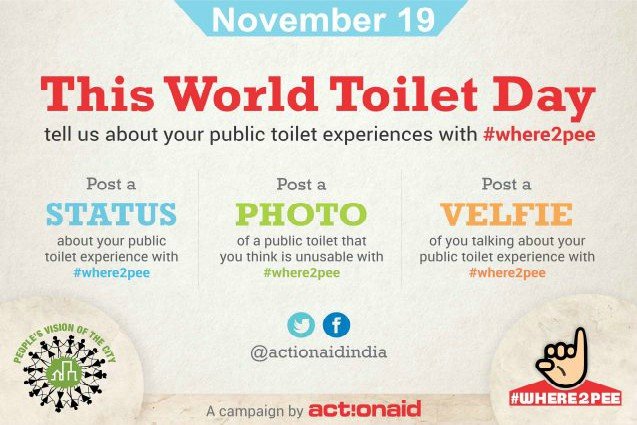Why should we talk about ‘peeing’ and defecating?
Of course we need to!
A healthy adult human being pees 6-8 times daily. This essentially means that toilets are an absolute necessary for all of us. Many men do not see a problem, but women even those amongst us, who work in an office or have access to toilets, have felt this problem when we travel. Think about the plight of people who don’t have easy access to toilets. Think of the people, especially women, who spend most of their time on the roads and are unable to pee due to unavailability of clean, working and sale public toilets. Isn’t it really difficult to hold on to your pee for 8-10 hours a day? Isn’t denying access to sanitation denying basic human rights.
By people working on the road we are referring to the city makers, the informal workers who do not have a designated work-place. They do not have access to private toilets but are solely dependent on community/public toilets. Today, public or community toilets are either totally absent, or scarce, and even if they are present they are dilapidated and unfit for use.
If we take the example of Mumbai, till 2012 for more than 20 million people there were 10000 public toilets, 37% of that was open to women. Most of the toilet charge in India Rs.1-Rs.5 (legally or illegally) to women for each use, which makes her, spend an average of Rs.20 each day. https://broadly.vice.com/en_us/article/the-women-in-india-fighting-for-the-right-to-pee
It’s easier for men who very comfortable tend to pee on the roadside- a shameful act though! Women and girls have to bear the burden of this basic necessity – i.e. absence of community/public toilets. Have you ever witnessed any women doing so? Then the question is where do women pee if there is lack of public toilet?
Talking about women and their sanitation needs have always been a taboo in most societies – and India is not an exception. Women need to urinate more often than men, and more so during the menstrual cycles. A high percentage of women hold their urine for long hours, at times the whole day due to lack of toilet facilities. This has several severe consequences on women’s kidney, bladder, bacterial infection in the urinary tract and overall body system due long retention of urine and less elimination of waste through urination. http://steptohealth.com/problems-holding-your-pee/
On the occasion of the World Toilet Day on 19th November, People’s Vision of the City, a initiated by ActionAid India raised the question “Where to pee?” – to find out how people see the need for public toilets in the city. A social media campaign has been launched to collect and share stories of discomfort and alternatives of the women in this country.
Alongside the campaign a survey was conducted on “Women’s Access to Public Toilets”. 375 women were interviewed across 12 underserved working class localities in Kolkata, Mumbai, Vizag, Hyderabad, Chennai, Lucknow andBhubaneswar. The respondents belonged to the age group of 25-45 yrs.
They were asked about Accesibility, Functionality, User Charges, Safety, and Health when it comes to using a public or community toilet.
The major findings of the survey were:
- 40% women say there are no separate toilets for women. They resort to open defecation.
- Majority of the women said that they experience stomach ache when they have to wait for long hours in search or absence of a public toilet,
- 67% of the respondents either suffer from stomach infection or UTI (urinary tract infection) ; which might be due to regular use of unhygienic public toilets.
- When public toilets were present:
- 89% women say that locks don’t work and doors are not there.
- 82% women say there are no taps or water supply in the toilet
- 90% women say they are afraid to access the toilets at night because of safety reasons.
The major demands articulated by the respondents were:
- Make public toilets available near housing colonies and slum settlements.
- Make provision of locks, water supply and lights in toilets.
- Make provision of a security guard in the public toilets for access during night.
 Author: Pritha Chatterjee
Author: Pritha Chatterjee




